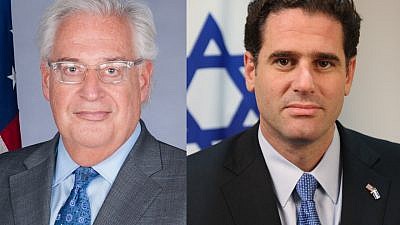Amid the fallout of the decision to bar Rep. Rashida Tlaib (D-Mich.) and Rep. Ilhan Omar (D-Minn.) from entering the Israel for their self-titled tour of “Palestine” organized by the pro-BDS organization Miftah has come a fury of attacks on Israel’s and America’s respective ambassadors, Ron Dermer and David Friedman.

Dermer has come under fire for first telling Democratic Party leaders, weeks before the scheduled trip, that Tlaib and Omar would be permitted to enter, saying at the time: “Out of respect for the U.S. Congress and the great alliance between Israel and America, we would not deny entry to any member of Congress into Israel.”
Following Israel’s reversal on Dermer’s assertion, House Majority Leader Steny Hoyer, who only a week earlier in Jerusalem pledged the importance of bipartisan support for Israel, called the decision “outrageous.”
“This action is contrary to the statement and assurances to me by Israel’s ambassador to the United States that ‘out of respect for the U.S. Congress and the great alliance between Israel and America, we would not deny entry to any Member of Congress into Israel,’ ” said Hoyer. “That representation was not true.”
According to a report by McClatchy news service, several senior Democrats, including Foreign Affairs Committee chairman Eliot Engel (D-N.Y.) and Appropriations Committee chairwoman Nita Lowey (D-N.Y.) have now taken specific aim at Dermer.
McClatchy quotes an unnamed “senior congressional source” saying that “with Dermer, the issue is that there already was a severe lack of trust. But now there is a severe lack of confidence. It is completely unclear that he represents his government, given he has made promises that he has not kept and wasn’t clear if he ever had any chance of keeping.”
In Israel, Dermer has received similar treatment. Rather than support his envoy to the United States, Israeli Foreign Minister Israel Katz undiplomatically threw Dermer under the bus when it appears quite clear that Dermer isn’t to be blamed for Israel’s final decision. In an interview with Channel 12’s Meet the Press, Katz stated that Dermer’s assurance “was not with the prime minister’s blessing. It was not a decision of the Israeli government. It was not with my blessing. He gave his opinion.”
As foreign minister, Katz should ordinarily have sought to protect Israel’s envoy. Yet Dermer is no ordinary ambassador. In addition to his deep knowledge of the American political system, which makes him highly effective at advancing Israeli interests within the political system of Israel’s most important ally, he possesses an asset most ambassadors and even some foreign ministers can never acquire: a direct line to the prime minister.
Katz, on the other hand, was appointed to the role of foreign minister as part of a lame duck cabinet shuffle two months before the April elections in order to fulfill a court mandate that Israeli Prime Minister Benjamin Netanyahu not simultaneously hold the positions of foreign minister and defense minister in addition to the country’s top job. It is highly unlikely that Katz will maintain his current portfolio following the Sept. 17 elections.
It was Netanyahu, Katz’s immediate predecessor in the foreign ministry, who offered a more diplomatic and appropriate statement explaining Israel’s reversal. Netanyahu said, “When Ambassador Dermer spoke, there was no specific request regarding these visits; neither was there an itinerary or a specific travel plan. As soon as these arrived, we checked it and reached the decision that we did. This was a principled, not a partisan, decision. We respect all political parties in the U.S. equally; however, we also respect ourselves. Whoever comes to impose boycotts on us and to deny the legitimacy of the State of Israel, we will not allow them entry.”
Dermer was appointed ambassador seven years ago following an extensive stint as Netanyahu’s senior advisor, a role Dermer continues to maintain unofficially even while stationed in Washington. The trust Netanyahu has in Dermer runs so deep that the prime minister recently stated when asked about who should succeed him, he replied: “There are two people I consider fit to lead the State of Israel: [Mossad Intelligence director] Yossi Cohen and Ron Dermer.”
In an increasingly polarized political environment in the United States, Dermer first provoked the ire of several Democrats in 2015, when he worked with then-Speaker of the U.S. House of Representatives John Boehner to have Netanyahu address a joint session of Congress, during which he famously opposed the Iran nuclear deal (Joint Comprehensive Plan of Action, or JCPOA) promoted by President Barack Obama.
The deal, according to Dermer “did not prevent Iran from obtaining nuclear weapons, but rather paves Iran’s path to nuclear weapons.” While Democrats opposed Netanyahu’s address, which would not have been possible without Dermer’s strategic abilities and deep political ties, the speech has proven itself as a watershed moment in Israeli diplomacy.
First, the controversial address ultimately led to U.S. President Donald Trump’s withdrawal from the JCPOA. Secondly, Arab states that were similarly threatened by the deal saw the strength of Netanyahu in publicly challenging an ally and the world’s greatest superpower. Many Persian Gulf states have dramatically improved their relations and defense coordination with Israel after the address, and now see the Jewish state as a critical ally in countering a nuclear Iran. Dermer calls it “the silver lining, if there is one,” of the Iran deal.
While the speech opposed the policies of a Democratic president, it was not made because the president was a Democrat. Had a Republican signed the Iran deal, Netanyahu and Dermer would have been equally opposed to it. A nuclear Iran is not a partisan issue to Israelis.
And yet despite criticisms that the speech was a partisan affair, Dermer continued working successfully with both Democrats and Republicans to advance Israel’s interests. He was able to ink perhaps his finest diplomatic achievement to date with the very same Obama administration that was offended by the congressional address. At the close of Obama’s term, Dermer led direct negotiations with the administration on a 10-year, $38 billion package to provide for Israeli security needs for years to come.
It is precisely this aid package that Democrats point to while criticizing Israel’s decision to bar the pro-BDS congresswomen. Omar and other anti-Israel Democrats, including 2020 presidential candidate Bernie Sanders, are now calling for the United States to re-evaluate the aid to Israel, which is essentially a call for America to sanction Israel for the decision.
Yet it is these calls by progressive Democrats that highlight the importance of the long-term aid package. The Memorandum of Understanding (MOU) Dermer helped shape will continue to provide for Israel over the next decade was passed first on the executive branch level, and only later codified into law by a Congress that now has progressive anti-Israel elements within its ranks.
As for Friedman, the same McClatchy article notes that Democratic lawmakers may call for an investigation “into the role the ambassador played in barring them from entering the country.”
Immediately after Israel’s announcement, Friedman released a statement saying that “the United States supports and respects the decision of the Government of Israel to deny entry to the Tlaib/Omar delegation.”
While many Democratic representatives didn’t agree with the decision, Friedman’s boss—Donald Trump—most certainly did. Just hours before the ban, Trump tweeted: “It would show great weakness if Israel allowed Rep. Omar and Rep. Tlaib to visit. They hate Israel & all Jewish people, & there is nothing that can be said or done to change their minds. Minnesota and Michigan will have a hard time putting them back in office. They are a disgrace!”
Friedman, too, possesses a key asset most diplomats simply do not have: a direct line to the president. As a trusted lawyer of Trump for years before the mercurial leader began his presidential run, Friedman already had Trump’s confidence.
It was Friedman and Special Representative for International Negotiations Jason Greenblatt, also a longtime Trump lawyer, who helped the president formulate his Mideast policy.
In his role as ambassador, Friedman has been instrumental in several key policy moves made by the Trump administration, including the recognition of Jerusalem as Israel’s capital, the move of the U.S. embassy and ambassador’s residence from Tel Aviv to Jerusalem, the defunding of UNRWA, and most recently, U.S. recognition of Israeli sovereignty over the Golan Heights (a move Dermer has acknowledged “would not have happened without Friedman”).
While critics note that Friedman comes from outside of traditional diplomatic circles, it is this outsider view that helps him guide a president who comes from outside the traditional political arena.
So while criticism is being leveled at the respective ambassadors, they are targets precisely because of the confidence they have built with their nation’s leaders. And it is precisely those relationships that make them such effective envoys.
Alex Traiman is managing director and Jerusalem Bureau Chief of Jewish News Syndicate.


























